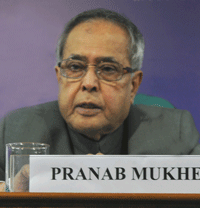President cautions govt against ordinance raj
19 Jan 2015
 President Pranab Mukherjee today cautioned the government over its frequent recourse to ''ordinance route'' for normal legislations, saying that ordinances are meant for specific purpose ''to meet an extraordinary situation under extraordinary circumstances.''
President Pranab Mukherjee today cautioned the government over its frequent recourse to ''ordinance route'' for normal legislations, saying that ordinances are meant for specific purpose ''to meet an extraordinary situation under extraordinary circumstances.''
The President's comments come after the Modi government has taken recourse to ordinances eight times in eight months of its existence.
He also cautioned the government against trying to pass legislation through joint sessions of Parliament, since the present government is short of a majority in the upper house of Parliament, the Rajya Sabha.
During a video conference with the students of central universities, IITs, NITs and other institutions today, Mukherjee advised the ruling and opposition parties to find a workable solution on law-making and avoid issuing ordinances for normal legislations.
Mukherjee said the constitution provides scope of issuing ordinances in extraordinary situation but this route cannot and should not be taken for normal legislation.
The President said the Parliament's role in policy articulation, its implementation and oversight is critical. It is, therefore, incumbent on members of Parliament to discuss and undertake adequate scrutiny of all business transacted in the House. Unfortunately, the time devoted by the members in Parliament has been gradually declining.
He noted the time spent by members in Parliament has nearly halved compared to the first three Lok Sabhas. Against 677, 581 and 578 sittings, respectively, in the first three Lok Sabhas, he said, the 13th, 14th and 15th Lok Sabhas had 356, 332 and 357 sittings, respectively. We all should hope that the 16th Lok Sabha reverses this trend.
The President also warned the opposition against the growing tendency to resort to disruption as a means of Parliamentary intervention. ''Dissent is a recognised democratic expression, but disruption leads to loss of time and resources, and paralyses policy formulation,'' he said.
''The cardinal principle of parliamentary democracy is that the majority has the mandate to rule while opposition has the right to oppose, expose, and if the numbers permit, to depose. But, under no circumstances should there be disruption of the proceedings. A noisy minority cannot be allowed to gag a patient majority,'' he added.
''A legislature is effective only if it is able to address the differences amongst stakeholders and succeeds in building a consensus for the law to be enacted and enforced. When the Parliament fails in discharging its law-making role or enacts law without discussion, it breaches the trust reposed in it by the people. This is neither good for the democracy nor for the policies anchored in those laws,'' he pointed out.
The President said policies have to address concerns of different stakeholders in a society in the larger national interest and as guided by its Constitution, is aided by Parliament's oversight to ensure that programmes are carried out by the executive legally, effectively and for the purposes they are intended. Parliamentary oversight also extends to money and finance. Every taxation and every receipt and expenditure to and from the Consolidated Fund of India is subject to the approval of the Lok Sabha or Vidhan Sabha, he pointed out.
The other important supervisory power of the Parliament over the executive is that the highest executive authority, ie, the Prime Minister and the council of ministers function as long as they enjoy the confidence of the popularly-elected House and can be removed by a simple majority of the House through a motion of no-confidence.
The President said to meet certain exigencies and under compelling circumstances, the framers of the Constitution deemed it necessary to confer limited legislative power upon the executive by way of promulgation of ordinances when the legislature is not in session and circumstances justified immediate legislation. The framers also deemed it necessary to impose certain restrictions on this extraordinary legislative power by constitutionally mandating replacement of such ordinances within a timeframe by the legislators. Article 123 (2) provides that an ordinance must be replaced by a law not later than six weeks from the re-assembly of the two Houses. Article 85 further provides that six months shall not intervene between the last sitting of one session and the first sitting of the next session.
The President said India's diversity and the magnitude of its problems require that the Parliament becomes a more effective platform to build consensus on public policies and a bulwark of our democratic ideals. The proceedings in Parliament must be conducted in a spirit of cooperation, harmony and purpose. The content and quality of debates should be of a high order. Maintenance of discipline and decorum in the House and observance of etiquette and decency are necessary.
The President said Parliament should not yield its space for legislating and policymaking to mass mobilisation and street-protests, for that may not always provide considered solutions to our problems. To retain the trust and faith of the people, the Parliament must enact laws to put in place policies that address the concerns and aspirations of the people.



















